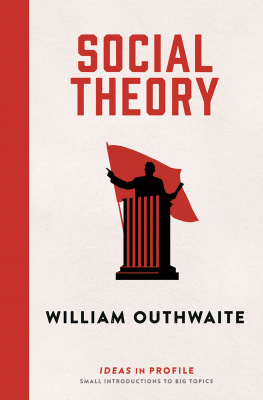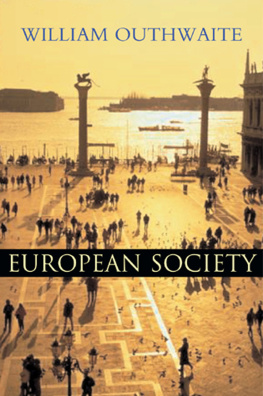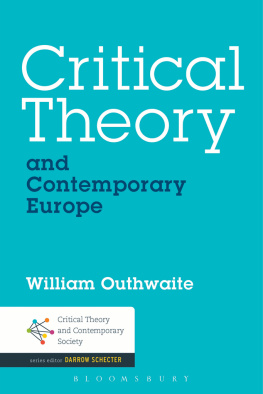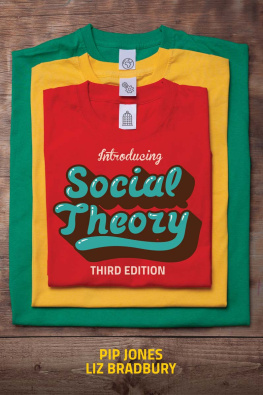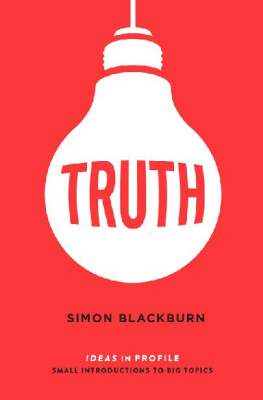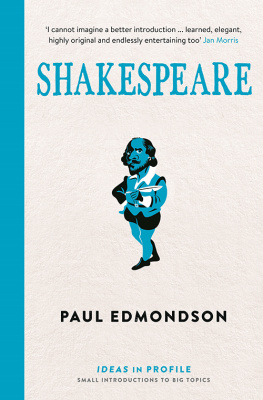William Outhwaite - Social Theory: Ideas in Profile
Here you can read online William Outhwaite - Social Theory: Ideas in Profile full text of the book (entire story) in english for free. Download pdf and epub, get meaning, cover and reviews about this ebook. publisher: Profile, genre: Politics. Description of the work, (preface) as well as reviews are available. Best literature library LitArk.com created for fans of good reading and offers a wide selection of genres:
Romance novel
Science fiction
Adventure
Detective
Science
History
Home and family
Prose
Art
Politics
Computer
Non-fiction
Religion
Business
Children
Humor
Choose a favorite category and find really read worthwhile books. Enjoy immersion in the world of imagination, feel the emotions of the characters or learn something new for yourself, make an fascinating discovery.
- Book:Social Theory: Ideas in Profile
- Author:
- Publisher:Profile
- Genre:
- Rating:4 / 5
- Favourites:Add to favourites
- Your mark:
- 80
- 1
- 2
- 3
- 4
- 5
Social Theory: Ideas in Profile: summary, description and annotation
We offer to read an annotation, description, summary or preface (depends on what the author of the book "Social Theory: Ideas in Profile" wrote himself). If you haven't found the necessary information about the book — write in the comments, we will try to find it.
Social Theory: Ideas in Profile — read online for free the complete book (whole text) full work
Below is the text of the book, divided by pages. System saving the place of the last page read, allows you to conveniently read the book "Social Theory: Ideas in Profile" online for free, without having to search again every time where you left off. Put a bookmark, and you can go to the page where you finished reading at any time.
Font size:
Interval:
Bookmark:
SOCIAL THEORY
William Outhwaite studied at the universities of Oxford and Sussex, taught at Sussex and Newcastle, and has been Emeritus Professor of Sociology at Newcastle University since 2015. He is the author of numerous groundbreaking books on social theory.

ALSO BY WILLIAM OUTHWAITE
Understanding Social Life: The Method Called Verstehen
Concept Formation in Social Science
New Philosophies of Social Science: Realism, Hermeneutics and Critical Theory
Habermas: A Critical Introduction
The Future of Society
Social Theory and Postcommunism (with Larry Ray)
European Society
Critical Theory and Contemporary Europe
Europe Since 1989: Transitions and Transformations
EDITED
The Habermas Reader
The Blackwell Dictionary of Twentieth-Century Social Thought (co-edited with Tom Bottomore)
The Blackwell Dictionary of Modern Social Thought
The Sociology of Politics (co-edited with Luke Martell)
Defending Objectivity (co-edited with Margaret Archer)
The Sage Handbook of Social Science Methodology (co-edited with Stephen P. Turner)
SOCIAL THEORY
WILLIAM OUTHWAITE

First published in Great Britain in 2015 by
PROFILE BOOKS LTD
3 Holford Yard
Bevin Way
London WC1X 9HD
www.profilebooks.com
Copyright William Outhwaite 2015
The moral right of the author has been asserted.
All rights reserved. Without limiting the rights under copyright reserved above, no part of this publication may be reproduced, stored or introduced into a retrieval system, or transmitted, in any form or by any means (electronic, mechanical, photocopying, recording or otherwise), without the prior written permission of both the copyright holder and the publisher of this book.
A CIP catalogue record for this book is available from the British Library.
eISBN 978 1 78283 175 4
Designed by Jade Design www.jadedesign.co.uk
To the memory of Roy Bhaskar (19442014), theorist and comrade
INTRODUCTION
If you are interested in political or economic questions, or culture, or gender or ethnic relations, social theory explains the relations between them. You might like to think of this as having it all.
Take globalisation, which has transformed our world and been a big topic of academic and public discussion since the 1990s. Early accounts stressed the economic aspects and political implications for nation-states, but sociologists quickly pointed out that the globalisation of culture was equally important and, crucially, interrelated with the other dimensions. Its possible to write a perfectly decent book about the globalisation of production, trade or financial markets, but if youre going to focus on the world as a whole, as theories of globalisation aimed to, it makes no sense to chop it up into separate economic, political and cultural domains and treat them in isolation. For one thing, what two social theorists in the middle of the twentieth century called the culture industry is just that: an increasingly global industry employing millions of people. If cultural consumption is about taste, its also about money and politics (soft power or influence). Among the causes of the collapse of communism in Europe at the end of the 1980s was the influence of Western and local rock music, and related movements like punk.
Social theory is the best framework we have for thinking about these relations. Take another term which has been heavily used in the last thirty years, modernity. An economic historian will focus on the rise of markets and wage labour in Europe; a political scientist will focus on the growth of state bureaucracies and political representation in parliaments; a sociologist will talk about the emergence of an industrial society or, in more Marxist language, about advanced or late capitalism. But a broader conception of modernity covering all these dimensions is what we need. Modernity in this sense is future-oriented, focused on the development of new ways of producing goods and organising human social and political relations. This is what social theory has provided over the past few hundred years and particularly since the 1980s.
Social theorists, then, ask the big questions and return to them again and again, in different forms in successive generations. The history of social theory is more like the history of philosophy than a history of science that presents it as a succession of discoveries. But there are parallels with what the twentieth-century historian of science Thomas Kuhn called scientific paradigms: exemplary achievements, whether technical or conceptual, such as Lavoisiers discovery of oxygen in 1777, which transformed our understanding of combustion and respiration, and in doing so changed the face of science and human knowledge. Kuhn also used the word paradigm to refer to frameworks of explanation and shared assumptions what he sometimes called a disciplinary matrix. Paradigms of the first kind tend to lead to those of the second.
We can use the term paradigm, as I do in this book, for some classic explanatory attempts in social theory which fed into distinctive styles of social thought and continue to be relevant today. I say attempts, because none of them is accepted without question and most, as we shall see, have been superseded in later decades. But thats not the point; were interested in them because they introduce ways of explaining things. They set theoretical and political agendas. We are still, for example, thinking about inequality in terms shaped over 250 years ago. We now pay more attention to gender inequalities and to global (rather than just national) differences in wealth and income, but older ideas of equality of opportunity and the relation between natural and social inequalities (and increasingly, for obvious reasons, the political critique of obscenely excessive wealth) remain at the centre of thinking about these questions. In short, this book explains why social theory is an essential part of understanding the world.
Many of the thinkers discussed in this book defined themselves or were later defined as sociologists (the word sociology was popularised in the 1830s by Auguste Comte who also inaugurated the term positivism to refer to the scientific study of nature and society and came into general use in the early twentieth century), but social theory is a broader family, encompassing, for example, Hegel, Marx, Nietzsche, Foucault, perhaps Freud and certainly Frantz Fanon, Edward Said and other writers who shaped post-colonial theory. (The term social theory was popularised in the UK in 1971 by Anthony Giddens, who reserved sociology for more specific work emerging in the late nineteenth and early twentieth century that focused on industrial society.)
YOU READ IT FIRST HERE: INNOVATIONS AND CONTINUITIES IN SOCIAL THEORY
The privileged really come to consider themselves as a different species Abb Sieys
The worst is when you have the poor to defend and the rich to contain Jean-Jacques Rousseau
These quotations do not come from a twenty-first-century social critic. The first is from 1788, the year before the outbreak of the French Revolution, and the second from a little earlier, in 1755. Our thinking about inequality, one of the topics of , is now focused once again on the ultra-rich, the 1%. I will sketch the circumstances of then and now, showing how ideas that inspired revolution centuries ago remain powerfully relevant. Continuities of this kind run through social theory. The key innovation was the idea, which seems to have emerged in Europe and North America in the seventeenth and eighteenth centuries, that human societies can be understood as human products, shaped by underlying processes but also able to be reshaped by human intervention. The idea of knowing the causes of things is much older (in Europe, the phrase goes back to the Roman poet Virgil, just before the Christian era), but the idea of the social as a distinct realm of reality is new.
Next pageFont size:
Interval:
Bookmark:
Similar books «Social Theory: Ideas in Profile»
Look at similar books to Social Theory: Ideas in Profile. We have selected literature similar in name and meaning in the hope of providing readers with more options to find new, interesting, not yet read works.
Discussion, reviews of the book Social Theory: Ideas in Profile and just readers' own opinions. Leave your comments, write what you think about the work, its meaning or the main characters. Specify what exactly you liked and what you didn't like, and why you think so.

